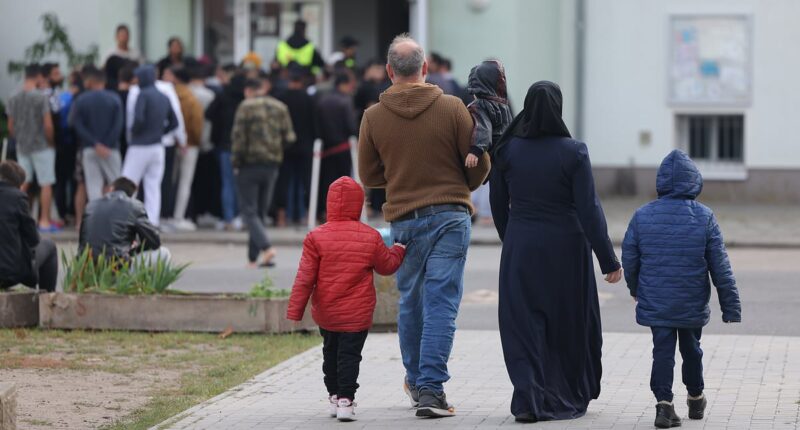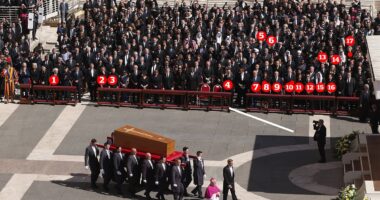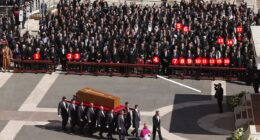Austria is making arrangements to send back Syrian refugees, while Germany and France are considering halting the processing of asylum requests from the nation following the removal of President Bashar al-Assad and his oppressive government.
The Austrian interior minister, Gerhard Karner, has directed the ministry to organize a systematic return and deportation scheme for Syrians.
The conservative Chancellor of the country, Karl Nehammer, has halted all current asylum applications from Syrians and initiated a reassessment of all asylum approvals, as stated by the interior ministry.
Some 100,000 Syrians live in Austria, one of the biggest populations of displaced people from the country in Europe, with thousands waiting for asylum applications to be approved.
Meanwhile Germany has taken in almost one million Syrians, the biggest diaspora from the war-ravaged country in Europe, with the majority arriving in 2015-16 under ex-chancellor Angela Merkel.
The country’s interior ministry today said it has suspended decisions on asylum requests from Syrians amid the ‘unclear situation’ in the war-torn country.
Meanwhile the French government has said it is working on a suspension of current asylum cases from Syria, with a solution expected to be similar to Germany’s decision to put applications on hold.
Politicians in Switzerland have also urged their country’s government to follow suit, with the leader of the right-wing People’s Party (SVP) saying: ‘If Syrians in Switzerland are celebrating the end of Assad, they should all go back.’

A man stands next to tents housing asylum seekers in the intake center in Thalham near St Georgen im Attergau, Upper Austria (file image)

Migrants and refugees arriving from Austria wait to be registered at a processing center on January 27, 2016 in Passau, Germany (file image)

A group of migrants is seen at a centre near Calais in France in 2021 (file image)

Security staff walk inside a reception centre for asylum seekers in Switzerland (file image)
Marcel Dettling reportedly called for the country’s asylum minister to begin repatriations as soon as possible, telling him: ‘The people fled from Assad at the time and were temporarily taken in. But this reason for fleeing is no longer there.’
But it remains unclear whether the developments in Syria will stabilise the country, with politicians across Europe urging their governments to wait and see what sort of leadership will fill the power vacuum left by the Assad regime.
Swiss liberal leader Thierry Burkhart argued that while Assad’s ousting is a positive development, he is ‘skeptical whether the situation for the population will really improve’.
Germany’s interior Minister Nancy Faeser said that the end of Assad’s ‘brutal tyranny… is a great relief for many people who have suffered from torture, murder and terror,’ adding that many refugees will now ‘finally have hope of returning to their Syrian homeland and rebuilding their country.’
But, she cautioned that ‘the situation in Syria is currently very unclear,’ meaning that ‘concrete possibilities of return cannot yet be predicted at the moment and it would be unprofessional to speculate about them in such a volatile situation.’
‘In view of this unclear situation, it is right that the Federal Office for Migration and Refugees has today imposed a freeze on decisions for asylum procedures that are still ongoing until the situation is clearer,’ she said.
Foreign ministry spokesman Sebastian Fischer also emphasised that the changing events are no guarantee of peace.
‘The fact that the Assad regime has been ended is unfortunately no guarantee of peaceful development,’ he told a media briefing.

Syrian refugees wait in a queue at Cilvegozu crossborder gate before entering in Syria at Reyhanli district in Hatay, on December 9, 2024
‘Whether this new situation will result in new refugee movements or whether, on the contrary, if the situation stabilises, displaced persons and refugees will have the opportunity to return to their homeland in the long term, remains to be seen,’ Fischer said.
Germany’s interior ministry says there are now 974,136 people with Syrian nationality residing in the country.
Of these, 5,090 have been recognised as eligible for asylum, 321,444 have been granted refugee status and 329,242 have been granted subsidiary protection, a temporary stay of deportation, with tens of thousands of other cases still pending.
Between 2015 and 2021, 20,319 Syrian migrants came to the UK under a government relocation scheme.
A further 9,766 Syrians have been granted asylum in the UK in the last three years after arriving irregularly, with Syrian nationals making up about eight per cent of small boat arrivals in the last six years.

An elderly man wearing a knitted Syrian scarf wipes his tears as people gather in London’s Trafalgar Square – December 8, 2024

Two demonstrators hold red roses as they take part in a gathering with other supporters and members of Syrian community in Trafalgar Square – December 8, 2024

A man draped in a Syrian opposition flag at the celebrations in London’s Trafalgar Square – December 8, 2024
Assad fled on a plane as insurgents closed in, with Russian state media confirming yesterday he had been granted asylum in Moscow.
Last night, dramatic pictures showed hundreds of Syrians with bags and suitcases gathered on the Lebanese border hoping to cross back into their country.
The United Nations High Commissioner for Refugees has said there is already some evidence of Syrians returning.
It has verified 34,000 returning home in the first eight months of 2024 and says the ‘actual figure may be significantly higher’.
However experts believe that if deposed president al-Assad’s downfall leads to more stability in the country then it could have the opposite effect, with Syrians returning home in their thousands.
‘Spontaneous returns to Syria are expected to continue throughout 2025,’ the UN refugee agency added in its assessment of the country.
Video footage shows traffic jams are cropping up in some areas as refugees scramble to return home.
Thousands of people in cars and on foot congregated at a main square in Damascus on Sunday waving flags belonging to the Syrian opposition and chanting ‘Freedom’.

















